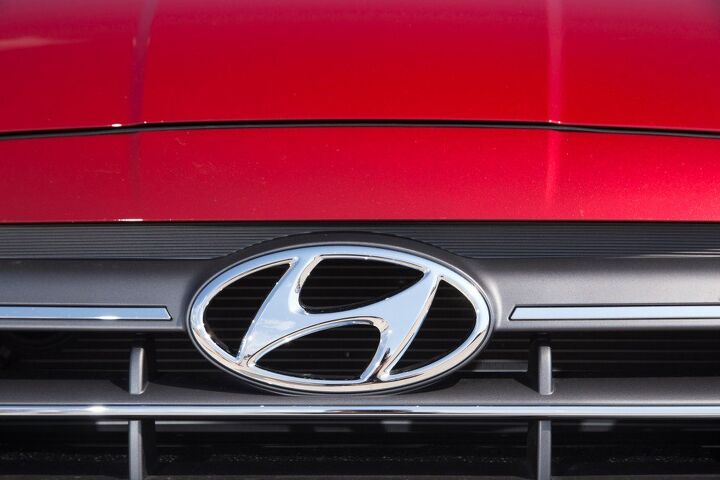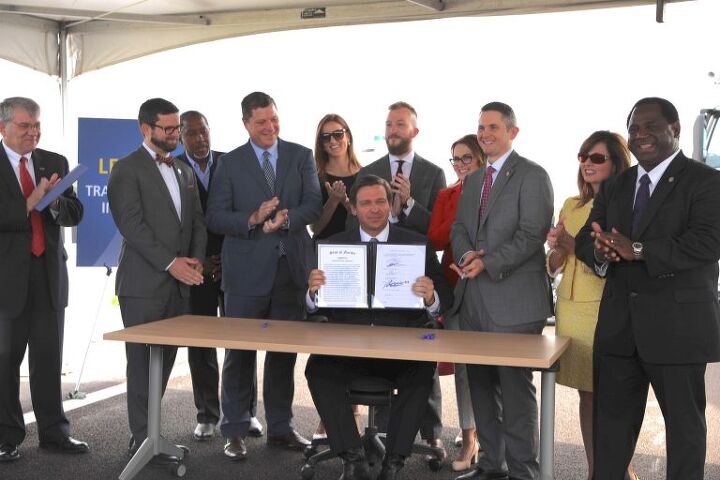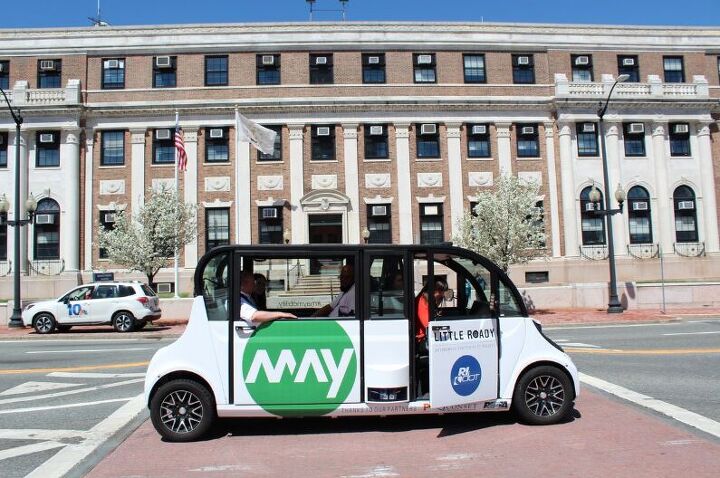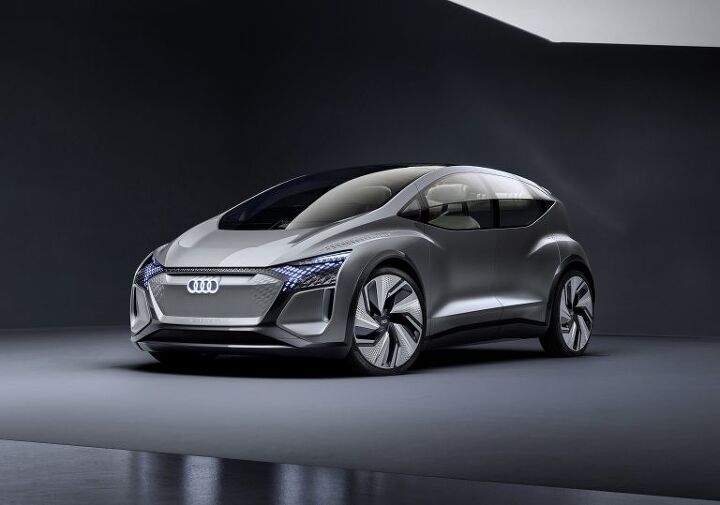#AVs
Apple Co-founder Claims Autonomous Cars Aren't Happening
Apple co-founder Steve Wozniak has officially given up on autonomous vehicles, despite previously being a major proponent of their advancement. “I stepped way back [on] this idea of Level 5. I’ve really given up,” Wozniak at last week’s J.D. Power Auto Revolution conference in Las Vegas. “I don’t even know if that will happen in my lifetime.”
Automotive News reported the quote on Monday, noting that Steve’s tune has changed dramatically from the days where he optimistically saw Apple blazing the trail for advanced driving technologies — something that requires one to venture several years into the past. He’s been harder on the systems more recently, openly expressing his growing doubts since 2017.
“What we’ve done is we’ve misled the public into thinking this car is going to be like a human brain to be able to really figure out new things and say, ‘Here’s something I hadn’t seen before, but I know what’s going on here, and here’s how I should handle it,'” Wozniak explained. “A human can do that.”
Hyundai Gets Real About Autonomous Cars
Automakers have begun leveling with us about vehicular autonomy. After years of promises that self-driving cars were just around the corner, the vision rollback has begun. Testing has taken longer than anticipated and nobody is as close to unleashing a commercial product as they hoped to be. Waymo’s self-driving taxis are arguably the closest, but they’re still dependent upon human safety drivers. They also don’t stray far from areas of operation that have been repeatedly mapped and deemed safe.
While nobody has given up on the technology, claims are becoming less lofty. Realism is creeping into press releases and interviews, resulting in a more complicated pathway to autonomy. Hyundai Motor Group’s heir apparent, Vice Chairman Chung Eui-sun, recently announced the creation of a $4 billion self-driving joint venture with Aptiv, but the plan is more modest than what we’ve become accustomed to.
Automakers Asks NHTSA to Remove Autonomous Hurdles
The National Highway Traffic Safety Administration has been pretty good about letting companies test autonomous vehicles on public roads. And yet pretty much every automotive manufacturer, ride sharing firm and tech giant still wants laxer rules. To a degree, it’s understandable. Take General Motors, for example. Back in 2017, GM sought exemptions from NHTSA to deploy fully automated vehicles without steering wheels or pedals, but that would have placed the car in clear violation of preexisting safety standards — as they were not in line with the General’s vision of what a self-driving car should be.
GM’s autonomous division recently said the self-driving Cruise AV it had been prepping for the end of this year will likely have to be delayed. While development issues assuredly played a role in stalling the car’s commercial deployment, it could never have launched as initially designed anyway.
Earlier this year, the Federal Motor Carrier Safety Administration (FMCSA) and NHTSA asked for input regarding the testing of automated vehicles to help decide if the “removal of unnecessary regulatory barriers” would be a prudent move. You can probably guess the feedback received from the automotive and tech industries.
Another Study Shows Consumers Hesitant to Embrace Mobility
With automakers investing heavily into the development of electrified and autonomous vehicles, it might seem there is a gigantic consumer base ready and raring to go out and buy them. But every study we’ve encountered suggests the exact opposite. Electric cars are still limited to tech fetishists with regular folks occasionally deciding to become early adopters. Meanwhile, AVs are still in their infancy with engineers keen to document every baby step they take as the public remains ill-informed on their overall status.
It was presumed, however, that this would change as development progressed and “mobility” became more mainstream. But a new study from J.D. Power, backed by Survey Monkey, has showed — once again — this is not yet the case. Based on a 100-point scale, the duo’s 2019 Mobility Confidence Index yielded a score of 36 for self-driving vehicles and 55 for battery-electric vehicles.
Ford Triples Down on Mobility, Acquires Two Tech Firms
While mobility has placed the automotive industry in a state of minor limbo, manufacturers achieving a major breakthrough may yet ascend to heaven — financially speaking. Ford has promised to deliver robot-driven taxis within a couple of years and expended quite a bit of cash to get there since acquiring Argo AI in 2017. However its autonomous arm, Ford Smart Mobility, has only encountered mixed success. Progress in terms of self-driving has been incremental, with the company shuttering some of the side businesses that explored alternative revenue streams (e.g. Chariot) and losing millions though its software investments.
Disinterested with failure, Ford partnered with Volkswagen Group earlier this year. As part of the deal, VW agreed to dump another 2.6 billion into Argo in hopes that it would accelerate development. Ford said it would be taking things a step further on Tuesday and announced the acquisition of two more tech companies.
Some Drivers Still Oblivious About Automated Systems, IIHS Faults the Name Game
Many consumers continue to misunderstand the driver-assistance technologies being placed in modern vehicles, according to the latest survey released by the Insurance Institute for Highway Safety. But we don’t need the IIHS to tell us that. We’ve been documenting the avoidable accidents created whenever motorists overestimate what their high-tech cars are capable of for years now.
However, the insurance institute and numerous consumer advocacy groups have suggested that big part of the problem stems from the names manufacturers are using to describe their semi-autonomous hardware. Titles like “Autopilot” or “Driving Assistant Plus” can be confusing to somebody who didn’t bother to read the manual, especially when the associated marketing materials are often helping to steer them further in the wrong direction.
Florida Governor Signs Bill Allowing AVs Without Human Safety Drivers
Florida Governor Ron DeSantis signed CS/HB 311: Autonomous Vehicles into law on Thursday, claiming the state has effectively removed “unnecessary obstacles that hinder the development of autonomous vehicle technology,” including human safety operators.
Provided that a vehicle meets all insurance requirements, Florida will no longer require AVs to operate with a flesh-and-blood person behind the wheel. However, those that do remain in the driver’s seat, will also be exempt from the state’s distracted driving laws.
Emphasis on Safety: Uber, Volvo Launch Next Generation of Autonomous SUVs
Uber Advanced Technologies unveiled the next generation of its self-driving SUV on Wednesday. Sticking with the Volvo XC90 as a platform, Uber stated that the latest prototypes should be capable of operating autonomously, adding that previous versions were not necessarily built with full autonomy in mind and required the presence of a safety driver behind the wheel.
While past versions of Uber’s test platform essentially retrofitted vehicles purchased from Volvo Cars, this new batch was co-developed with the automaker. Volvo said the project represents the “next step in the strategic collaboration between both companies.”
Volvo previously claimed that the cyclist killed by one of Uber’s autonomous test vehicles in 2018 might still be alive had the firm not tampered with the automatic emergency braking system all XC90s come equipped with. Uber’s latest SUVs utilize all of Volvo’s existing safety features, building on top of them with its own systems and creating as much redundancy as possible.
GM's First Self-driving Car May Keep Manual Controls
This time last year, we were under the impression that General Motors’ first attempt at an autonomous vehicle would come without pedals, a steering wheel, or any other controls traditionally associated with driving. Cruise Automation, the GM subsidiary tasked with developing the vehicle, seemed confident it could deliver something that didn’t need to rely on human intervention to be truly safe. This promise was reiterated by GM in January of 2018 via a request to produce the car sans controls though federal exemption.
U.S. laws governing what constitutes a safe automobile were written before autonomous vehicles entered development, creating problems. It wasn’t evident to anyone that GM could legally manufacture a vehicle that lacked traditional controls, as existing laws stipulated that all automobiles had to have them. While the Department of Transportation has proven rather lenient on policing AVs in terms of testing, rewriting the Federal Motor Vehicle Safety Standards or providing exemptions was a bridge too far — especially when self-driving tech is new, frequently misunderstood, and backed heavily by corporate interests. The existing guidelines remain unchanged and new legislation pertaining to self-driving vehicles has stalled in Congress.
Apparently sick of waiting, General Motors now appears satisfied to just build AVs with manual controls.
It's My First Day: Self-driving Mobility Shuttle Pulled Over in Rhode Island
Self-driving shuttle company May Mobility expanded its operations to include Rhode Island this week. The state agreed to pay the firm $800,000 for the first year of operations, allowing it to get its six-passenger micro shuttles running between an Amtrak station and downtown Providence as part of an ongoing pilot program.
However, one of the shuttles was pulled over just hours after entering service for a rather baffling reason.
GM's Cruise Sees Another Billion-dollar Investment
General Motors’ self-driving vehicle unit, Cruise, has attracted new investors and an equity infusion of $1.15 billion as it continues work on its commercial fleet of autonomous taxis. The new investment, which effectively brings the operation’s valuation to $19 billion, is primarily fronted by Baltimore-based asset management company T. Rowe Price Associates Inc. and existing partners like SoftBank’s Vision Fund and Honda Motor Co.
“Developing and deploying self-driving vehicles at massive scale is the engineering challenge of our generation,” said Cruise CEO Dan Ammann. “Having deep resources to draw on as we pursue our mission is a critical competitive advantage.”
How Are Autonomous Vehicles Supposed to Make Automakers Money?
As we continue reporting on how costly mobility projects, connectivity, and autonomous development are weighing on automakers’ bottom line, readers want to know exactly when these endeavors will become profitable. While the path for data acquisition and in-car marketing is fairly clear, self-driving cars are new territory. But it’s all speculative. Logistical, ethical and regulatory issues abound — and legislators seem rather poorly informed on the technology in general.
For now, companies have a pass to test autonomous vehicles in limited quantities across the United States. The next move, which some firms (like Waymo) have already undertaken, involves adapting test-bed AVs for use in commercial fleets. Profitability is another matter, and concerns are mounting that the technology isn’t ready and might not be for some time.
Promise Hour: Tesla Broadcasts Self-driving Tech to Perk Up Investors
Tesla celebrated “Autonomy Day” on Monday, broadcasting a web presentation to investors touting its self-driving strategy — part of CEO Elon Musk’s attempt to prove that the manufacturer’s longstanding commitment to the technology will bear fruit. While the mood was undercut by news of one of its vehicles spontaneously combusting in a Shanghai parking garage, the company stayed the course, focusing on autonomy instead of electrification.
Still, it wasn’t the fire that had investors seeking comfort. Tesla’s promise of fully self-driving vehicles is years old, with Musk initially pegging 2018 as the target date. That didn’t happen, with 2018 turning out to be the year the company faced elevated scrutiny over the effectiveness of its Autopilot system after a series of high-profile crashes.
Audi's New Mobility Egg
Audi’s pitching more than just new models at Auto Shanghai this month; it’s promoting a new way to drive. The AI:ME Concept is a summonable, self-driving urban electric, aimed at reshaping the company’s business model — or at least examining that possibility. While Audi refers to the vehicle as a highly specialized premium automobile that can be ordered as needed and offers “extensive possibilities for individualization as part of an on-demand offer,” the company also noted the AI:ME “need not pass into permanent personal ownership.”
The automaker was careful not to use the phrase, but these vehicles would operate under a loosely defined subscription or rental model where customers book a car via their smartphone or computer, stipulating how they need it to be configured for their journey. From there, the vehicle makes its way to the designated pickup point and applies the final adjustments based on previously established seating, climate, lighting, entertainment, and control preferences.
Trump's No Fan of Autonomous Vehicles, Like Most Other People
Donald Trump apparently belongs to the 71 percent of Americans who remain averse to the thought of riding in self-driving cars. It’s a position that appears to be incongruous with the National Highway Traffic Safety Administration’s deregulation strategy. But there’s always a little room for someone’s personal preference to exist in tandem with public policy. At least, there used to be.
Considering the president’s involvement in American industrial matters routinely make him the central focus of auto-related topics, we’ll keep this one relatively brief. But the accompanying details of this story are too interesting to simply ignore.





























Recent Comments